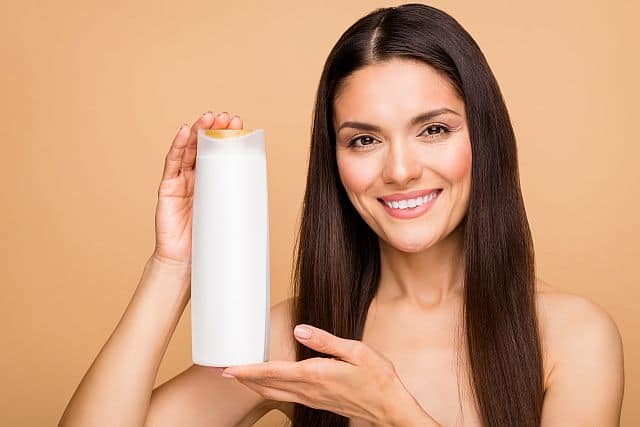Last Updated on December 16, 2022 by Gaga
Since keratin treatment is an expensive and time-consuming process, you’ll want to take the appropriate steps to care for your hair by choosing a shampoo and conditioner that will ensure its longevity. To preserve the smoothness of keratin-straightened hair, you should use shampoos and conditioners that are formulated without sulfates and sodium chloride. Before buying any aftercare product, check the label to ensure that the product is compatible with your keratin treatment.
Why Should You Avoid Sulfate-Containing Shampoos After Receiving a Keratin Treatment?
Generally, sulfate-based shampoos are not recommended for chemically treated hair. The cuticle of processed hair can easily be lifted due to the action of harsh lathering agents, which leads to dryness and the appearance of frizz. Sulfates can also strip proteins from your hair. Many experts believe that strong sulfates such as sodium laureth sulfate can significantly shorten the longevity of keratin treatment and lead to the appearance of frizz.

Is Sodium Chloride Bad for Your Hair?
Sodium chloride is used in hair shampoos as a thickening agent because of its ability to increase the thickness of liquid personal care products. However, sodium chloride tends to lift the cuticle and pull moisture and proteins out of hair. Salt can diminish the duration and quality of keratin treatments, so you will need more frequent reapplications. Any product that opens up the cuticles should be avoided after receiving a keratin treatment.
Sodium chloride is not a toxic substance and even some brands of organic shampoos may have salt listed on the label. However, if your hair is chemically straightened, make sure that your shampoo and other hair products are free of sodium chloride.
Keep in mind that salt water also contains sodium chloride and can negatively affect the keratin treatment you have received.
The Purpose of Sulfates in Hair Shampoos
Sulfates are powerful cleansing agents, that are included in hair shampoo formulas to provide better lathering ability. When mixed with water, sulfates effectively lower surface tension in the water, making it easy to wash away oil and dirt from your hair. The most common sulfates in conventional shampoos include SLS (sodium lauryl sulfate), ALS (ammonium laureth sulfate), and SLES (sodium laureth sulfate).
SLS and SLES are inexpensive detergents that efficiently remove excess oil from the scalp and hair. However, harsh sulfates in hair shampoos can strip hair of natural oils, leaving your locks prone to frizz and leaving your scalp dry and vulnerable to irritations.
Common Adverse Effects Associated with Sulfates in Hair Shampoos
Although very common in hair care products, sulfates do more bad than good when used as a primary cleansing agent. The following is a list of negative adverse effects associated with sulfates in hair shampoos:
- The cleaning power of sulfates is overwhelming and can strip the hair of its natural oils, leaving your strands dry and frizzy.
- Sulfate-based shampoos can compromise the natural moisture balance of your scalp, causing itchiness and redness.
- Sulfate-based detergents create deposits in hair follicles that may result in hair loss. The damaged follicles have a hard time recovering, and your hair may grow slower than normal.
- The aggressive cleaning action of sulfate detergents can strip the color from your hair, leaving you with dull and lifeless locks.
- Sulfate cleaning agents remove good bacteria that are necessary for having a healthy scalp, leaving your skin vulnerable to infections.
- Sulfate cleansers tend to destroy the protective oil layer of the skin, allowing potentially toxic chemicals to penetrate the deeper dermal layers and accumulate in the body.
- The negative effects of using sulfate-containing shampoos are not limited to the hair and your overall health. Sulfates in personal care products also pollute our groundwater and the environment.

Benefits of Using Sulfate-Free Shampoos
Sulfate-free shampoos have become very popular recently as consumers increasingly opt for more natural personal care products. Here are some more benefits of using shampoos without sulfates:
- Hair shampoos without sulfates eliminate dirt and excess oil without ruining the skin’s protective moisture barrier.
- Natural cleansing agents gently cleanse your strands without stripping their moisture, which helps reduce breakage and shedding.
- Using a shampoo without sulfates helps preserve the hair color for longer.
- Using sulfate-free shampoos protect your hair against premature aging, reducing the occurrence of gray hair.
- Sulfate-free shampoos leave your hair soft and easier to style.
- Hair shampoos formulated with mild detergents reduce your exposure to potentially harmful chemicals.
Final Word
The sulfate-containing shampoos will not ruin the effects of your keratin treatment overnight. However, to stay on the safe side, use shampoos with mild detergents and with natural ingredients. This will be good for your hair and scalp in the long run. Finally, if you want your straightened hair to stay sleek and beautiful, make sure to avoid shampoos with sodium chloride.

Gaga is a blogger and founder of the Softer Hair website. She often says that insomnia is to blame for her first blogging attempts. Being the night owl, she hated the morning alarm. She left her office job and returned to what she loved most - writing.


Will the nova fusion color care shampoo – silver by De Lorenzo strip out my keratin treatment? The bottle does say it Sulfate-free; Paraben-free, but I am scared to use another brand apart from keratin as I’ve heard that other brands will strip out Keratin?
Nova Fusion Color Care Shampoo Silver by De Lorenzo doesn’t contain sodium chloride or SLS in its formula. It will not ruin your keratin treatment, but if you prefer using products free of parabens, you might want to consider some other shampoos suitable to tone down the brassiness that is formulated without sulfates and sodium chloride.